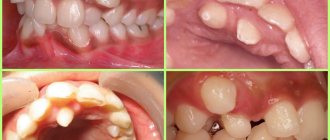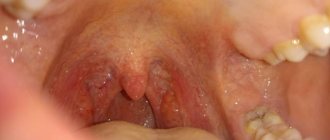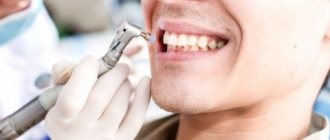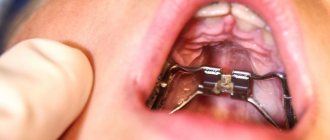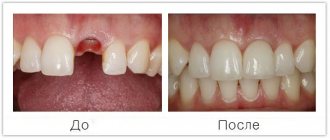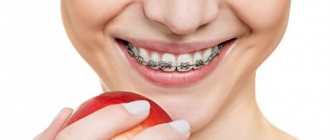One of the most important parts of the oral cavity is the palate. It is responsible for the ability to talk and is also involved in the chewing process. Since our body is filled with various bacteria and microorganisms, some of them, in high concentrations in the oral cavity, cause inflammation, swelling and itching of the palate. The mucous membrane facilitates the penetration of pathogenic microorganisms into the teeth, salivary glands, and soft tissues. In such a situation, it is difficult for a person to understand what causes the itching. The palate of the mouth itches: causes, associated symptoms and treatment methods - we’ll talk about this in the article.
The palate of the mouth itches: reasons
What is the palate?
The palate is the upper part of the oral cavity. This is the septum that separates the nasopharynx and mouth. Next, the vault of the oral cavity passes into the larynx. The palate is divided into two sections: hard and soft.
Structure of the oral cavity
The main function of the palate is to protect the nasopharynx from foreign objects, such as food particles. It also allows you to set the correct direction for the air flow during breathing.
The palate plays an important role in ventilation of the middle ear. It allows you to adjust the internal and external pressure on the membranes, acting as a kind of tuning fork. Also, the palate, in combination with the larynx, is responsible for the timbre of the voice and its pitch. In various languages of the world, this organ helps to form unique sounds.
Interesting! When making the sound “R,” speech therapists teach children to place their tongue on the roof of their mouth.
The palate is one of the most important parts of the vocal apparatus
Causes of itching
The main reasons why the palate in the mouth itches is considered to be inflammatory and infectious processes. Scratching can also be caused by mechanical injuries received in the process of life.
In turn, there are many reasons that cause inflammation or infection of the mucous membrane of an organ.
- Stomatitis.
There are several forms of the disease, each of which is accompanied by itching, the appearance of ulcers and a characteristic plaque, redness of the area and pain upon contact with any irritants (brush, food, liquid, fingers, etc.). The origin of the disease has not been fully studied, but it has been established that ulcers and inflammatory processes occur against the background of weakened immunity and the presence of microcracks in the soft part. Stomatitis on the palate
- Systemic diseases. It is no secret that diseases of the ENT organs (especially the throat and tonsils) often cause redness and inflammation of the mucous membrane. Laryngitis, tonsillitis, sore throat and even the common flu can cause itching inside the mouth.
- Mechanical injuries.
We get them regularly in the process of eating (hard, “prickly” foods), using household items (cutlery, toothbrush, dental floss, etc.). Less common are blows to the jaw, bruises from a fall, or a dislocation or fracture in the area, which can also cause inflammation of the soft tissues. Improperly fixed dentures and implants, braces, as well as poorly ground fillings, chipped teeth, etc. can damage the mucous membrane. - Chemical and thermal burns. In the process of consuming food and liquid, we often burn the palate. Brewing hot drinks, eating food from the stove, as well as indulging in ice cream and cold drinks - all this causes irritation of the soft part and, as a result, itching. We get chemical burns in this area as a result of eating too sour, salty or spicy foods, as well as after sucking lollipops and some tablets.
- Neuralgia. Some diseases of the nervous system affect the condition of the mucous membrane, causing it itching and redness, and the appearance of a characteristic coating or tint.
- Dental diseases and pathologies. Advanced diseases (pulpitis, gingivitis, deep caries, periodontitis, periodontal disease, osteomyelitis and many others) cause swelling and inflammation of the entire oral cavity, and not just the area of the affected tooth and periodontal tissues. Do not be surprised that periodontitis that is not treated in a timely manner can cause itching in the palate.
- Candidiasis.
Oral thrush is common in infants, but is also diagnosed in adults. Yeast causes redness of the entire mouth, including the roof of the mouth, as well as the appearance of characteristic white cheesy plaques and ulcers underneath. Candidiasis is not the sky
We suggest you familiarize yourself with a sweetish taste in the mouth, what is it
The disease is accompanied by severe itching and pain.
- Herpes. This viral disease is often diagnosed in adults, especially in the lips and inner cheeks. But in rare cases, herpes blisters can be found on the tongue and palate, which is accompanied by severe itching and redness.
- Allergic reaction. In the case of the use of oral medications or allergenic products (drinks), the oral mucosa reacts quite quickly - the soft tissues swell, itch, hurt and go numb. Additionally, swelling of the lymph nodes and even the ears and gums is noted.
Diagnosis of the disease
Since itching of the palate accompanies many diseases, only a specialist can make a correct diagnosis after diagnosis. If the symptoms are not clearly expressed, there may be a slight inflammation, which can be cured by the immune system. But since almost all diseases entail complications, sometimes very serious, you need to seek medical help.
To determine the pathology, you need to consult a doctor
It is possible to identify symptoms that unite all diseases that cause itching of the palate:
- pain, tingling of the mucous membrane;
- redness of the throat;
- ulcers on the oral mucosa;
- sore throat;
- swelling of the mucous membrane;
- increased body temperature in some cases.
Most often, itching of the palate is accompanied by swelling of the mucous membrane, redness of the throat, soreness, and mouth ulcers.
You can conduct a preliminary self-examination before going to the doctor. This will help to more accurately formulate the symptoms and make the task easier for the specialist:
- ENT diseases are accompanied by pain and swelling of the throat, increased salivation, swollen lymph nodes, and fever;
- mechanical damage and burns are accompanied by pain, redness, and damage to the mucous membrane;
- with neuralgia, neurological symptoms develop;
- candidiasis and herpes cause a rash, redness of the mucous membrane, and increased body temperature;
- allergies are manifested by allergic symptoms;
- stomatitis causes ulcers on the surface of the mucous membrane, bad breath, excessive salivation and high fever.
You can do a preliminary oral self-examination
There are a number of signs that indicate the need for urgent medical attention:
- active manifestation on the skin (abscess, profuse rash, necrotic phenomena);
- body temperature at 40 degrees;
- feverish condition.
Important! If even the slightest sign of any disease appears in a child, you should immediately consult a doctor. Often this is a sign of the onset of stomatitis, and the sooner you start treatment, the more effective and easier it will be.
If you notice various manifestations on the skin, you should immediately consult a doctor.
Of course, in some cases the patient manages to independently eliminate all the unpleasant symptoms, such as tickling of the pharynx, sore throat, burning and itching of the palate. Such actions are not encouraged by official medicine, but they have a reason: it is stupid to seek medical help for a minor allergic reaction. In such a situation, it is recommended to eliminate all allergens from consumption, take antihistamines, and use soothing compresses.
In case of a thermal or chemical burn, as well as stomatitis, it is recommended to adhere to a diet, eating food and drinks at room temperature, and avoiding sour, salty, and spicy foods. Damage to the mucous membrane in this case is eliminated by rinsing with a regenerating effect, as well as wound-healing ointments.
If you have stomatitis, you need to stick to a diet
Mechanical damage to the oral cavity involves eating soft foods, neutral drinks, rinsing the mouth, and using wound-healing ointments. If the injury occurs due to a prosthesis or filling, you need to seek help from a dentist.
Important! Still, you need to remain clear-headed and open-minded with this approach, so that if alarming symptoms appear, you should seek the advice of a doctor.
Complications from an advanced disease can be completely different: from an abscess, exacerbation of chronic diseases to decreased immunity, against the background of which infections living in the patient’s body begin to actively spread.
If left untreated, an abscess may develop
Complications occur very rarely. The main reason for their development is ignoring all symptoms and lack of proper treatment. All this can be avoided if you promptly pay attention to changes in well-being and begin treatment with the help of a doctor. This approach minimizes negative consequences and allows you to restore health in a short time.
The specialist begins the diagnosis with a careful examination of the oral cavity. Next, a series of laboratory tests are carried out: smears are taken from the mucous membrane to determine the cause of the disease, a blood test for biochemistry, tests for sugar levels, hormones, allergens and antibodies to infections.
The doctor will take a swab from the oral mucosa
Important! You may have to visit several specialists - an orthodontist, a dentist, an endocrinologist, an allergist, an ENT specialist.
Why does the roof of my mouth itch?
Primary inflammation can develop under the influence of the following reasons:
- infections of a bacterial or fungal nature - this is indicated by such signs as a dirty white coating, redness, a large number of ulcers, pain and a burning sensation. Symptoms often make it difficult to even eat. In a child, the most common cause is stomatitis;
- tonsillitis - its obvious signs: the tonsils become larger, there is body aches, a sore throat;
- lack of hygiene and injury from chewing - these reasons are usually interrelated, since pathological microorganisms with proper hygiene will not lead to inflammation of small wounds. As a result of infection, not only ulcers, but also blisters are formed;
- dental problems and diseases - most often pulpitis and caries cause similar symptoms;
- leukoplakia – develops due to chronic trauma to the mucous membrane by food that is cold, hard or hot;
- removal of the nerve when the temporomandibular structure was affected, which was the beginning of inflammation;
- the use of prostheses in cases where there are no processes of muscle formation in the palate. The longer the wearing period, the more likely the occurrence of inflammation;
- galvanic currents when installing braces or crowns with metals;
- inflammatory process of the salivary glands - this often ends in the development of a tumor;
- change in the state of the environment in the oral cavity;
- malignant tumor.
We suggest you familiarize yourself with what the throat disease is called.
Diseases of the throat and larynx - causes, symptoms, treatment and prevention Sometimes symptoms appear as a result of an exacerbation of a chronic disease or allergy. During pregnancy, a woman is especially susceptible to various viruses; she may have an allergic reaction to something, with a runny nose and even a fever.
Pain in the palate sometimes even extends to the ears. With such signs, sleep is disturbed at night, and over time, absent-mindedness and forgetfulness appear. Similar symptoms can be caused by various diseases, including inflammation of the trigeminal nerve or neuroinfection.
If a person sneezes and has other symptoms typical of ARVI, then it is possible that the pain in the palate is caused by this very reason. However, the doctor must accurately establish this fact after tests and examination.
Prevention
As you know, it is better to prevent any disease than to treat it later. To avoid oral diseases, the following recommendations should be followed.
- Daily monitoring of health and oral mucosa.
- Regular use of mouth rinse.
- Avoid eating too hot or cold food.
- Visit your dentist for a preventive examination at least once every six months.
- Regular personal hygiene.
- Selecting the softness of the toothbrush bristles to suit your type of teeth and gums.
- Maintaining immunity.
In order to avoid this problem, you need to choose the right toothbrush.
All of the above measures will prevent the development of infectious or fungal diseases.
Itching of the palate is a common phenomenon that absolutely everyone experiences throughout their lives. You should not ignore the symptoms or self-medicate. It is necessary to contact the hospital for the help of a specialist who will conduct a competent diagnosis and prescribe treatment. Read the article for removable dentures for one tooth.
Treatment for itchy mouth
Therapy begins after determining the cause, that is, the disease causing itching in the mouth.
- For inflammatory diseases (stomatitis, gingivitis, gumboils, pemphigus, herpes), mouth rinsing with antiseptics (hydrogen peroxide, furatsilin, manganese solution, etc.) is used. Pathological formations are irrigated with sprays (inhalipt, hexoral, etc.), anesthetics are also used ointments for pain relief of mucous membranes (lidochlor). Depending on the origin of the infection, antibiotics, antiviral or antifungal agents are prescribed orally. The course of taking medications varies from 7 to 14 days.
- In cases of allergies, the main therapeutic drugs are antihistamines (diphenhydramine, claritin, suprastin).
- Neurotic disorders require the use of sedatives and psychotherapy.
We invite you to familiarize yourself with Gum massage for periodontal disease, periodontitis and after tooth extraction: technique with video
How to protect the oral mucosa
The reason that the palate and oral mucosa itch may be due to common dental diseases. Advanced caries, periodontal disease, and gingivitis can manifest as itching, irritation and inflammation of oral tissues.
Injury sustained while eating may result in soft tissue damage. The cause of damage to the mucous membrane may be the use of certain drugs, hot spices, and candies. In the absence of proper hygiene, microorganisms easily penetrate the mucous membrane, causing pain and itching.
Poor dentures cause discomfort in the oral cavity, so you should visit your dentist every 6 months to check their well-being.
Unpleasant sensations in the form of itching, irritation or discoloration of the skin can cause neuralgic disorders.
Important! A lack of B vitamins and minerals can cause itching of the mucous membrane, the palate is no exception.
Source: zubi.pro

